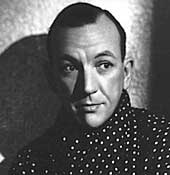How I Write My Songs |
By NOEL COWARD
I just go on with the business of living, like other people do, until something occurs to me. It may be while I am at dinner, or on a 'bus, or even while I am having a bath. If I am anywhere near a piano I fly to it and play the tune with one hand. That fixes it, as a photographer would say, and I can proceed with the rest in a more leisurely way. The next step is to get the harmony exactly as I want it, playing it over and over again if necessary. After that my task is practically ended. I play it to a trained musician, who writes the notes down and then repeats the piece to me so that I can make quite sure that he has reproduced it correctly. I may be asked why I do not do this theoretical work myself. How boring! Besides, I happen to know practically nothing about such matters. I have never had a lesson in pianoforte playing in my life. I once went to the Guildhall School of Music for a few lessons in harmony and composition, but found them so dull and tiresome that I gave them up. One does not need a deep knowledge of the mysteries of theory and musical form in order to compose light songs of the revue and musical comedy type. What is necessary is a perfect ear for pleasant sounds. When I think of what seems to me to be a good tune, the most suitable harmony suggests itself at the same time in a rough form, at any rate. 'I don't know whether I am breaking conventional rules of theory, and care less. The sound's the thing. Nearly all my life I have been able to pick tunes up readily after hearing them at a music-hall or theatre, and to play them on the piano. Lots of people can do that to a certain extent, though the difficulty in most cases is to reproduce the harmony correctly, for every popular success has some little peculiarity in that respect that may cause trouble. But the right gift, an absolutely correct musical ear, solves the problem in a moment. I do not know when I began to compose but I must have been very young. I used to write songs in collaboration with Miss Esme Wynne, who has been my friend since my nursery days. She wrote lyrics, and I tried to set them to music. I remember she wrote one which ran: Our little love is dying, I knew nothing about rhythm in those far-off days; the tune seemed to me the only thing that mattered. The music I composed caused the words to read this : Our little love is dying on his head Perhaps I was in a hurry. Unfortunately, I have always been pressed for time, and I usually work at a rapid rate., I wrote the whole of "On With the Dance" (now being presented at the London Pavilion)-music, lyrics and book-in month. My play, "I'll Leave It To You," was written in a few weeks. It was really through hurry that a certain unfortunate incident happened on the river some time ago. Miss Betty Chester and I were engaged to appear in " The Knight of the Burning Pestle," , and as the time for preparation was so short we decided to go to Oxford, where we could study our parts without interruption. We were in a canoe one day, studying for all we were worth, when the craft upset and our manuscripts got so wet that they were useless. Result, several days' delay until we obtained new copies. But I was talking about musical inspiration. One of my greatest successes was "Parisienne Pierrot", sung in "London Calling." The idea of that came to me during a visit to a cabaret in Berlin. I noticed a doll hanging on a curtain, and it seemed to impress itself on my mind. Soon afterwards, a melody which appeared to associate itself with the doll incident occurred to me, and - well, I just played it. I thought of the tune of my latest success, "Poor Little Rich Girl," while I was having tea. The usual dash for the piano, and the thing was done. But for some reason I wrote this song in four flats whereas I had always kept to three flats previously. There is no scientific explanation of it all. Some of us have these strange peculiarities, and some have not. I don't even know how I got my musical talent, unless it has been handed down from a grandfather who was organist for many years at the Crystal Palace. But I wonder if it is fair to his memory to say so? |
 MUSICAL inspiration is a peculiar sort of thing. It just
comes. One cannot sit down and think and think until melodies come to
the mind. I am much too busy for that, and, besides, that method would
never bring success-at least, not in my case.
MUSICAL inspiration is a peculiar sort of thing. It just
comes. One cannot sit down and think and think until melodies come to
the mind. I am much too busy for that, and, besides, that method would
never bring success-at least, not in my case.